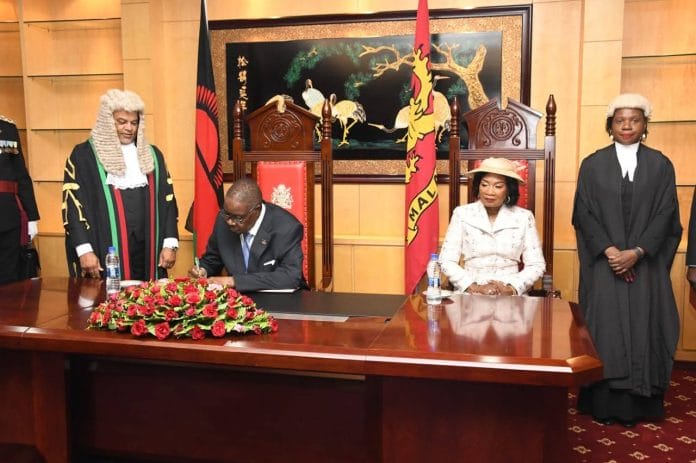BLANTYRE-(MaraviPost)-In the political landscape of Malawi, where regional loyalties and familial ties often cast long shadows over governance, the presidency of Professor Arthur Peter Mutharika stands out as a beacon of fair-mindedness and national unity.
It is essential to recognize that the leadership style of Mutharika transcends the often divisive narratives of nepotism and regionalism, showcasing a leader committed to the development and prosperity of all Malawians regardless of their geographic or familial affiliations.
One of the most compelling aspects of Mutharika’s leadership is his apparent focus on merit and competence rather than familial or regional favoritism.
This is evident in the diverse array of ministers appointed across the various regions of Malawi, each bringing their unique expertise and dedication to their roles.
For instance, the Southern Region, which has historically been a political stronghold, boasts competent individuals such as Joseph Mwanamvekha from Chiradzulu, who oversees crucial economic planning and finance matters.
Similarly, George T. Chaponda from Mulanje, entrusted with foreign affairs, exemplifies the leader’s recognition of talent over region or family ties.
In the Eastern Region, the appointment of Roza Mbilizi Fachi from Mangochi as Minister of Agriculture underscores a commitment to empowering competent leaders from different parts of the country.
Mangochi, known for its vibrant agricultural sector, benefits from leadership that understands local challenges and opportunities, demonstrating that Mutharika values regional expertise but does not prioritize it over merit.
Bright Msaka from Machinga, heading the education and technology sector, further exemplifies the administration’s focus on empowering capable individuals from diverse backgrounds.
The Central Region, often considered the political heartland, is represented by notable figures such as Ntcheu’s First Vice President and Alfred Ruwan Gangata from Dedza, serving in significant ministerial roles.
Their appointments reveal a leadership that recognizes the importance of regional balance and inclusivity, ensuring that no single area dominates governance at the expense of others.
The inclusion of Norman Chisale from Ntcheu as Deputy Minister of Homeland Security also highlights Mutharika’s strategic approach to regional representation that is rooted in competence rather than nepotism.
In the Northern Region, which has historically felt marginalized in national politics, the leadership’s inclusivity is particularly evident.
The appointment of Rumphi’s Second Vice President and others from the region demonstrates a conscious effort to balance regional representation, fostering a sense of national unity.
Charles Mhango from Rumphi, overseeing justice and constitutional affairs, exemplifies the leadership’s commitment to legal and institutional stability, regardless of regional origins.
What sets Mutharika apart is his apparent focus on national development and unity rather than regional or familial favoritism.
His appointments reflect a strategic and thoughtful approach to governance, emphasizing the importance of capable leadership across Malawi’s diverse regions.
This approach fosters a sense of inclusivity and shared purpose among Malawians, reinforcing the idea that leadership is about service and competence rather than ethnicity, kinship, or regional loyalty.
Moreover, Mutharika’s governance style is characterized by a deliberate effort to promote national cohesion.
His appointments seem to be guided by the principle that Malawi’s strength lies in its diversity and that effective leadership must harness this diversity for the country’s progress.
By appointing capable individuals from various regions, he ensures that policies and programs are reflective of the needs and aspirations of all Malawians, thus strengthening the fabric of national unity.
It is also worth noting that the leadership’s emphasis on regional diversity is complemented by a focus on developmental priorities that benefit the nation as a whole.
Whether it is in agriculture, health, education, or security, the appointments made by Mutharika reveal an understanding that the country’s development depends on competent individuals working together across regional lines.
This unity of purpose is the hallmark of a leader who values the collective good above narrow regional or familial interests.
Furthermore, Mutharika’s leadership style encourages a culture of professionalism and accountability among his appointees.
By selecting individuals based on merit, he fosters an environment where competence and dedication are rewarded, setting a positive example for the entire civil service and political landscape.
Such an approach not only enhances governance but also inspires young Malawians to pursue careers in public service driven by merit and integrity.
In addition, it is important to appreciate the broader context of Malawi’s political history.
The nation has long grappled with regional and familial loyalties that often threaten national cohesion.
Mutharika’s leadership represents a conscious departure from this pattern, emphasizing unity, national identity, and progress.
His appointments across regions serve as a testament to his belief that leadership should be inclusive and representative, not exclusive or divisive.
The support and admiration that Mutharika commands from many quarters are rooted in this perception of fairness and dedication to nation-building.
His ability to bring together diverse talents and perspectives into his government reflects a maturity and vision that many leaders aspire to but few achieve.
It is this inclusive approach that fosters trust among citizens, encouraging them to believe in a united Malawi where everyone’s voice matters.
Arthur Peter Mutharika’s presidency exemplifies leadership that is rooted in meritocracy and national unity rather than nepotism or regional favoritism.
His appointments illustrate a thoughtful and strategic approach to governance, emphasizing competence, inclusivity, and the collective good. Such leadership is crucial for Malawi’s continued development and stability, and it serves as an inspiring example for current and future leaders.
Mutharika’s commitment to building a united Malawi, where every region and individual has a role to play, truly defines a leader dedicated to the overall progress and harmony of the nation.
Discover more from The Maravi Post
Subscribe to get the latest posts sent to your email.



